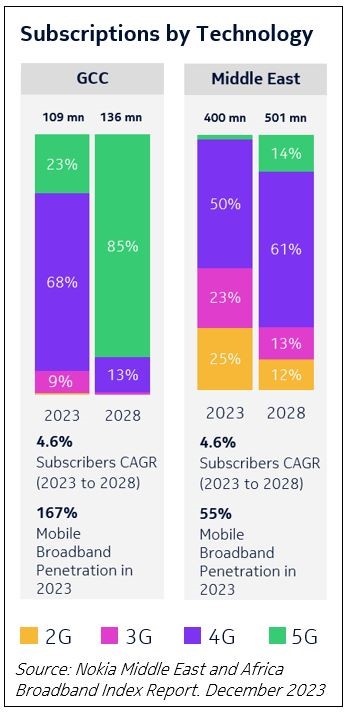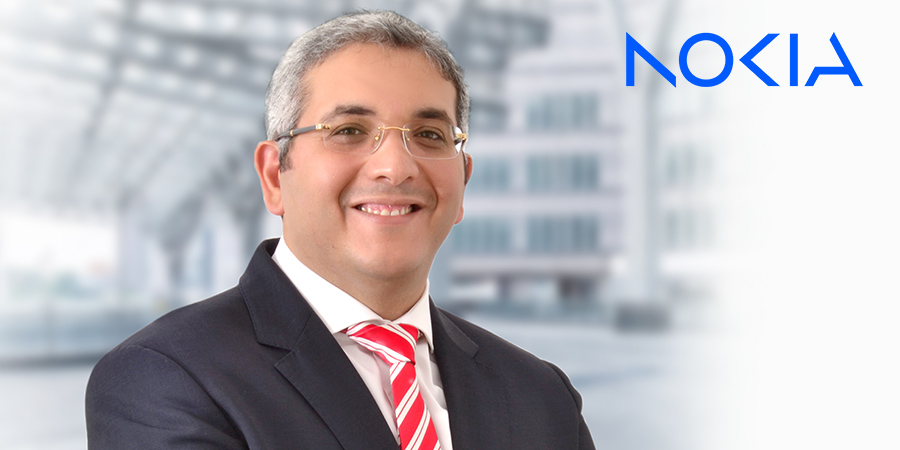In an exclusive interview with Telecom Review, Mohamed Samir, Vice President of Mobile Networks, Middle East at Nokia, delved into the company’s 2023 milestones, the current market dynamics, the latest mobile network innovations, and the importance of the enterprise market. Additionally, he highlighted the impact of AI on businesses and the society, and shared Nokia’s ESG priorities.
Could you please share some key achievements for Nokia in the Middle East in 2023?
Nokia, overall, grew net sales by 8% in constant currency in the Middle East and African market in 2023. In the Middle East, mobile networks gained significant market share across many countries. To give you a concrete example, Nokia was selected for nation-wide 5G network rollout by both Orange and Zain in the Kingdom of Jordan. These achievements are a strong testimony of the trust our customers put in Nokia’s technology and delivery capabilities and supports our ambition to be the preferred partner for our customers.
What are the market dynamics that you are currently observing in the Middle East?
The Middle East is a very diverse region. If we look at the GCC Countries, we see 5G quickly becoming the dominant technology, taking over 4G— and it is expected to grow from 23% adoption in 2023 to 85% in 2028. For the rest of the Middle Eastern countries, 4G is expected to carry 61% of the traffic by 2028, while 5G adoption will be more gradual and will reach 14%. Overall, we also expect subscribers to grow at a CAGR of 4.6%, adding 128M subscribers to the networks during the same period. So, there are many growth opportunities to address to build a digital and sustainable future in the Middle East.
What are the latest mobile network innovations you are introducing to the Middle Eastern market?
To address the growing business and connectivity requirements of our customers, Nokia is driving a wave of innovation in the Middle Eastern market, bringing cutting-edge technologies to add efficiency, flexibility, and scalability to the networks.
- Cloud RAN acts as the foundation, leveraging software-defined infrastructure to adapt to ever-evolving needs.
- This flexibility is amplified by Multi-Access Edge Slicing, which carves out dedicated network slices for diverse applications, from smart cities to the industrial IoT.
- Finally, 5G-Advanced RedCap unlocks the full potential of 5G by reducing the complexity and cost of 5G connectivity, unlocking new revenue streams in the Internet of Things (IoT), wearables and Industry 4.0 sectors.
How important is the enterprise market for Nokia?
The enterprise market is a strategic priority for us as we strive to secure a leadership position with digital enterprises. This segment now represents over 10% of our global annual sales and it’s growing. Embracing connectivity presents significant advantages, especially in heavy-industrial sectors such as manufacturing, oil and gas, mining, and logistics. Digitalization plays a pivotal role in bolstering industry sustainability, leading to decreased waste, enhanced resource efficiency, and heightened productivity, not to mention improved workers’ safety.
Notably, private wireless networks empower industrial customers to establish campus networks tailored to their unique specifications. For instance, Arçelik— the global leading consumer durables and electronics manufacturer— achieved a remarkable 25% efficiency boost and reduced energy consumption for automated guided vehicles through the deployment of a private wireless network in Turkey, in collaboration with Nokia and Türk Telekom. We are now seeing a growing interest in the Middle East for private wireless deployments.
How can businesses and society benefit from artificial intelligence (AI)?
The AI revolution is underway and will profoundly change our lives and how we work. Many companies, governments, and other organizations in the Middle East and around the world are investigating, testing, developing, and using AI. AI is already helping service providers streamline their operations for increased network performance, efficiency, and security, as well as improving energy efficiency and customer experience.
Further down the line, AI-based capabilities are huge research topics for discussion in the 6G standardization process. For businesses and industries, AI will increasingly supplement human intelligence, allowing workers and leaders to make better decisions, increase productivity and competitiveness, and develop more effective, agile, and sustainable business and operation models. At Nokia, we are embracing responsible AI as a fundamental technology in the development of our products and services, driven by strong research from Nokia Bell Labs over many years.
To conclude, could you please share some of your ESG priorities?
Today, one of our key priorities is to continuously improve the energy-saving features in our radio network products and reduce energy consumption and the cost of energy for our customers. Our long-term target is to reach net zero greenhouse gas emissions by 2040. We are working closely in the Middle East region with our ecosystem of local partners, suppliers, and customers towards that goal.
Another key area of focus for us is to further promote inclusion and diversity. We have therefore partnered with UN Women and many of our customers in the Middle East to bolster gender equality and women’s empowerment, in addition to promoting STEM (science, technology, engineering and mathematics) education to younger girls in many of the countries in which we operate.
For more information click here










